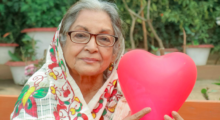 Many years ago, I worked as a nurse caring for children with cancer. And when I told people what I did for a living, their response was inevitably something along the lines of “Oh, that’s so sad! How can you do that? It must be so hard!” And then I would try to explain to them, probably not all that well, that taking care of children with cancer and their families wasn’t sad or depressing — that, in fact, it was one of the most joyful parts of my life.
Many years ago, I worked as a nurse caring for children with cancer. And when I told people what I did for a living, their response was inevitably something along the lines of “Oh, that’s so sad! How can you do that? It must be so hard!” And then I would try to explain to them, probably not all that well, that taking care of children with cancer and their families wasn’t sad or depressing — that, in fact, it was one of the most joyful parts of my life.
The situation was sad, certainly. Children aren’t supposed to get horrible diseases. They’re not supposed to suffer, and they are definitely not supposed to die. But that didn’t mean that the pediatric oncology unit was a “sad” place, even though sad things happened there. On the contrary, precisely because those things happened there, it was a place filled with kindness and hope and joy and an immeasurable amount of love — the kind of love I never experienced anywhere else.
Here in the United States, we spend an inordinate amount of time chasing happiness, especially at this time of year. We are inundated with images of “perfect” families gathered together celebrating the holidays– children delighted, not by the magic of the season but by the “perfect” gift under the Christmas tree. We have been fooled by decades of marketing hype and various permutations of the prosperity gospel into believing that life can be perfect if we work hard enough; try hard enough; and spend enough money on “things.” On some level, we know it’s not true. But we buy into it anyway, particularly around the holidays.

Credit: kids.britannica.com
But things were different on the pediatric oncology unit. There was holiday spirit there, certainly. We had a pretty Christmas tree and cheerful decorations, and carolers from the community came to sing holiday songs. We even had an annual visit from the Hell’s Angels, all decked out in leather on their Harleys bearing armloads of gifts. It was a fun time…a time to forget, even for a little while, why everyone was there.
But the kids on the oncology unit were wise beyond their years, and they were all well aware that Santa couldn’t bring them what they really wanted — a normal life. And their families knew that no gift, no matter how “perfect,” could take away the pain of the next spinal tap or bone marrow biopsy or IV start. No amount of spending could buy a cure for a cancer that wouldn’t go away.
Yet in spite of that, or more likely because of that, everyone there was able to come together — kids, parents, staff and volunteers — and share the holidays in a way that simply couldn’t happen anywhere else. Amid all the sadness and suffering, we connected in a way that only those whose hearts are broken can. And together we learned that empathy and kindness and compassion were the only gifts that mattered, and that they cost nothing but an open heart.

Of course, we all want to make the holidays special — to share the magic of the season and let our loved ones know how much we care. But I believe it’s also terribly important that we remember that all of the glitz and glitter we see in the stores and on TV is just window dressing, and that the only currency we really have to spend in this life is love.
So spend it freely. Give it away to everyone you meet. Talk to the homeless man sitting on the corner. Smile at the person sitting next to you on the bus. Tell your family how much you love them, not just with gifts, but with words. Hold your heart all the way open this holiday season, letting in the sadness as well as the joy. I guarantee you’ll be surprised at how you wonderful you feel.
“Cancer changes people. It sculpts us into someone who understands more deeply; hurts more often; appreciates more quickly; cries more easily, hopes more desperately, loves more openly, and lives more passionately “ ~Unknown.
About Kathleen
Each month Kathleen Clohessy, R.N., offers a new perspective on living with a terminal illness. Kathleen comes to SevenPonds with 25 years experience as a registered nurse caring for families and children facing life-threatening illness. She began her career in the Pediatric Intensive Care Unit at Nassau County Medical Center in New York. After relocating to California, she spent 15 years as an R.N. and Assistant Nurse Manager at the Pediatric Oncology & Bone Marrow Transplant Unit at Lucille Salter Packard Children’s Hospital at Stanford. She uses her knowledge and expertise to enlighten our readers about the challenges associated with chronic illness and its effects on family relationships.

 Children with Cancer Teach Us What the Holidays Are About
Children with Cancer Teach Us What the Holidays Are About


 Having an Estate Plan Is Essential – So Is Discussing It With Your Children
Having an Estate Plan Is Essential – So Is Discussing It With Your Children
 The Healing Sound of Singing Bowls
The Healing Sound of Singing Bowls
 “Summons” by Aurora Levins Morales
“Summons” by Aurora Levins Morales














